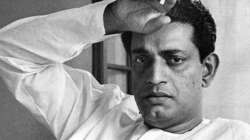Satyajit Ray's centenary celebrations stalled by pandemic, informs son Sandip Ray
The celebration of India's best-known moviemaker Satyajit Ray's centenary birthday celebrations will remain deserted. The ongoing pandemic and the health emergency which it has created hitting hundreds of thousands of people has forced the family to rethink plans for the celebrations as it thinks such events would be inappropriate at this time.

On the 100th birth anniversary of his legendary father, director Sandip Ray is reconciled to the fact that his 1/1 Bishop Lefroy Road residence, a place for pilgrimage for fans of arguably India's best-known moviemaker Satyajit Ray, will remain deserted. Sandip, who along with other family members had
earlier planned a year-long birth centenary which is now being postponed, told PTI he was not in favour of any zoom meet "which doesn't befit such an occasion involving an icon like Ray." The ongoing pandemic and the health emergency which it has created hitting hundreds of thousands of people has forced the family to rethink plans for the celebrations as it thinks such events would be inappropriate at this time.
"We had planned several events involving critics, film personalities, writers and experts from here and abroad who would have spoken on his works. We had planned exhibitions of his scripts, graphics and illustrations. Everything is now on hold," the director said.
The family feels that since Ray's birth centenary celebrations can continue till May 1, 2022, it can "hold these events on later dates when the pandemic situation improves substantially."
Describing shutting down Ray's residence to people wishing to pay homage on his birth centenary date, as a "not very happy situation for anyone", Sandip said, "Nothing less than a physical event will be fitting for a celebration of this scale. No virtual celebration for us, as far as we are
concerned."
The Bishop Lefroy Road house still has the furniture and nick-nacks that Ray used in his daily life from the armchair where he plotted Apu trilogy and 'Hirak Rajar Deshe', the writing table where he sketched the sets of 'Pratidwandi', 'Jana Aranya', 'Mahanagar' 'Chriakhana' and 'Sonar Kella', along with hundreds of memorabilia including awards and film posters lying around in the study and adjacent rooms.
"Whoever comes we have to tell him or her with folded hands, we are not allowing anyone inside as advised by doctors in the present situation," he said.
Sandip himself has made a mark by making movies on the detective and science fiction stories written by his father -- which include 'Royal Bengal Rahashya', 'Badshahi Angti' and 'Professor Shonku O El Dorado', did not specify the original programmes lined up for the centenary celebration or the
guests invited when asked.
Sandip said Ray was primarily a storyteller but in films like Pratidwandi (1970), Mahanagar (1963) and Hirak Rajar Deshe (1980), he had touched on political issues which came naturally through his narrative and were not thrust upon in a didactic manner. "Yes, he had made films which might have political elements but these were no attempts to preach or deliver a message. He was primarily a storyteller," he said.
"That was his craft of filmmaking, his forte, but as a socially conscious person he could not turn his back from socio-political issues in the 1970s, or the 1980s ranging from the unrest to unemployment," Sandip added.
Ray gave great importance to the fact that his film should have cinematic element whether they had political overtones or not, he never shied away to critique social evils, the 'Nishijapon' director said about the maker of movies like 'Devi' (1960), 'Sadgati' (1981) and 'Ganashatru' (1990).
Asked if Ray could have made certain films like 'Hirak Rajar Deshe' (1980) which had allegorical elements and was seemingly a commentary against the emergency rule of the 1970s, Sandip said, "These are all classics made by father, defying age or time. How can I say in what way he would have
responded to a situation in the present times."